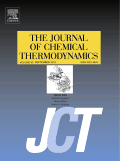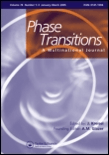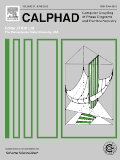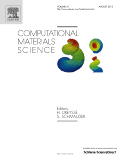
JOURNAL OF PHASE EQUILIBRIA AND DIFFUSION
Scope & Guideline
Unraveling the Mysteries of Diffusion Dynamics
Introduction
Aims and Scopes
- Phase Equilibria Studies:
The journal publishes research on the determination of phase diagrams and equilibrium relationships in multi-component systems, which are crucial for understanding material properties. - Thermodynamic Modeling:
Papers often include thermodynamic assessments using CALPHAD and other modeling techniques, providing a theoretical framework for predicting phase behavior and stability. - Diffusion Kinetics:
Research on diffusion mechanisms, atomic mobilities, and the kinetics of phase transformations is prevalent, highlighting the journal's emphasis on understanding how materials change over time. - Computational Techniques:
The use of computational tools, including molecular dynamics and first-principles calculations, is a consistent methodological approach in the journal, aiding in the exploration of complex materials systems. - Experimental Investigations:
The journal emphasizes experimental validation of theoretical models through detailed investigations of phase relationships, thermodynamic properties, and material behavior under various conditions.
Trending and Emerging
- High-Entropy Alloys:
There is a growing interest in the study of high-entropy alloys, highlighting their unique properties and phase behaviors, which are critical for advancing materials design. - Machine Learning and AI in Materials Science:
The integration of machine learning techniques for predicting phase stability and diffusion properties is increasingly common, signaling a trend towards data-driven approaches in materials research. - Nano- and Micro-Scale Phase Investigations:
Research focusing on nanostructured materials and their phase behavior is on the rise, reflecting the importance of these materials in modern applications. - Advanced Computational Thermodynamics:
There is an increasing trend towards employing sophisticated computational techniques, including first-principles calculations and CALPHAD methodologies, to model complex systems more accurately. - Sustainability and Green Materials:
Emerging themes include studies on sustainable materials and their phase equilibria, addressing the growing need for environmentally friendly materials solutions.
Declining or Waning
- Basic Phase Diagram Studies:
There has been a noticeable decline in studies focused solely on basic phase diagram determinations without accompanying thermodynamic models or advanced computational methods. - Traditional Metallurgical Approaches:
Research that focuses primarily on traditional metallurgical methods without integrating modern computational or thermodynamic modeling approaches appears to be waning. - Single-Component System Investigations:
Papers dealing exclusively with single-component systems have become less frequent, as the journal increasingly prioritizes complex multi-component interactions.
Similar Journals

JOURNAL OF CHEMICAL THERMODYNAMICS
Connecting Theory and Practice in ThermodynamicsThe JOURNAL OF CHEMICAL THERMODYNAMICS serves as a pivotal platform for the dissemination of high-quality research in the field of thermodynamics and its applications across various scientific disciplines. Published by Academic Press Ltd - Elsevier Science Ltd, this esteemed journal, with an ISSN of 0021-9614 and E-ISSN 1096-3626, strives to contribute to the understanding of the thermodynamic properties of chemicals, materials, and molecular interactions. Covering a broad spectrum of topics from atomic and molecular physics to general materials science, it consistently ranks in the Q2 category across multiple fields including Physics and Astronomy, Chemistry, and Materials Science. With its convergence years extending from 1969 to 2025, the journal boasts a respected history and a commitment to fostering scholarly dialogue among researchers, professionals, and students alike. Though it is not an Open Access journal, its rigorous peer-review process ensures that published articles meet the highest standards of scientific excellence, making it an essential resource for anyone seeking to stay at the forefront of chemical thermodynamics research.

PHASE TRANSITIONS
Illuminating Innovations in Material PropertiesPHASE TRANSITIONS is a prominent academic journal, published by Taylor & Francis Ltd, dedicated to advancing the field of phase transition phenomena across various materials and systems. With a history spanning from 1979 to 2024, this journal provides a vital platform for researchers to share their findings on the intricate behaviors of materials under different conditions, particularly in the domains of Instrumentation and Materials Science. Despite its current Q3 category ranking in both fields, PHASE TRANSITIONS plays a crucial role in pushing the boundaries of these areas, offering insights that contribute to significant innovations. Although it does not operate as an Open Access journal, its content can be accessed through various academic databases, ensuring that important research is available to the community. As reflected by its standing in Scopus rankings, researchers and practitioners alike will find the studies published in this journal to be relevant and impactful in broadening their understanding of material properties and behaviors.

PHYSICS AND CHEMISTRY OF MINERALS
Fostering Collaboration in Mineral Research ExcellencePHYSICS AND CHEMISTRY OF MINERALS, published by SPRINGER, is a premier journal dedicated to advancing the understanding of the physical and chemical properties of minerals, their interactions, and their significance in various geological processes. With an ISSN of 0342-1791 and an E-ISSN of 1432-2021, this journal serves as a vital resource for researchers and professionals in geochemistry and petrology, as well as materials science. Reflecting the journal's commitment to quality scholarship, it has achieved Q3 rankings in both Geochemistry and Petrology, and Materials Science (miscellaneous) categories. Established in 1977 and continuing through 2024, the journal has consistently provided a platform for high-impact research, fostering collaboration and innovation in the field. Located in Germany and reaching a global audience, PHYSICS AND CHEMISTRY OF MINERALS is instrumental for students, academics, and industry experts looking to stay at the forefront of mineral research and applications.

CALPHAD-COMPUTER COUPLING OF PHASE DIAGRAMS AND THERMOCHEMISTRY
Pioneering the Future of Phase Diagram ApplicationsCALPHAD: Computer Coupling of Phase Diagrams and Thermochemistry is an esteemed journal published by Pergamon-Elsevier Science Ltd, renowned for its contributions to the fields of Chemical Engineering, Chemistry, and Computer Science Applications. Established in 1977, this journal provides a platform for researchers and professionals to explore the innovative coupling of phase diagrams with thermochemical data, enhancing the understanding and application of these critical scientific principles. With an H-Index reflecting its significant impact within these fields, CALPHAD has maintained a Q2 quartile ranking in 2023 across its categories, highlighting its relevance and authority in ongoing research. The journal does not currently offer open access options, ensuring that articles undergo rigorous peer review before publication. With a focus on bridging computational and experimental methods, CALPHAD serves as an essential resource for advancing knowledge in phase transformation and thermodynamic modeling, catering to the needs of the academic community and industry practitioners striving for precision in material science and engineering.

DOKLADY PHYSICAL CHEMISTRY
Bridging Theory and Practice in Chemistry ResearchDOKLADY PHYSICAL CHEMISTRY is a prominent peer-reviewed journal published by MAIK NAUKA/INTERPERIODICA/SPRINGER, focusing on advancements and research in the field of Physical and Theoretical Chemistry. With the ISSN 0012-5016 and E-ISSN 1608-3121, this journal serves as a vital platform for researchers and practitioners to disseminate their findings and insights from 1996 to the present. Despite its current Q4 ranking in the 2023 category of Physical and Theoretical Chemistry, the journal has shown significant potential for visibility and engagement within the academic community, ranking #149 out of 189 in its respective field according to Scopus metrics, highlighting its dedicated readership. While the journal is not open access, it remains an essential resource for those seeking in-depth research articles, reviews, and commentary within this dynamic discipline. As the field continues to evolve, DOKLADY PHYSICAL CHEMISTRY plays a crucial role in fostering scientific dialogue and collaboration among researchers, professionals, and students worldwide.

Russian Journal of Physical Chemistry A
Unveiling Insights in Physical Chemistry ResearchWelcome to the Russian Journal of Physical Chemistry A, a prominent publication in the field of Physical and Theoretical Chemistry, published by MAIK NAUKA/INTERPERIODICA/SPRINGER. This journal, with ISSN 0036-0244 and E-ISSN 1531-863X, has been a vital platform for disseminating significant research findings since its inception in 1996. As a key contributor to academic discourse, it aims to provide high-quality articles that explore fundamental and applied aspects of physical chemistry, thereby enhancing understanding and innovation in the discipline. Although currently categorized as Q4 by Scopus (2023), the journal is positioned to evolve with the scholarly landscape, continually striving to improve its impact and relevance. With no open access options available, subscription to this journal is essential for those keen on enriching their knowledge and staying current with advancements in physical chemistry. Researchers, professionals, and students alike will find invaluable insights and robust discussions that can inspire their work and studies.

CONTRIBUTIONS TO MINERALOGY AND PETROLOGY
Exploring Earth’s Secrets Through Rigorous ResearchCONTRIBUTIONS TO MINERALOGY AND PETROLOGY, published by SPRINGER, is a premier journal in the fields of geochemistry, petrology, and geophysics, boasting an impressive impact factor that reflects its status as a leader in the discipline. With a history spanning from 1966 to 2024, this journal has consistently provided a platform for high-quality research that influences our understanding of earth materials and processes. Ranked in the top quartile (Q1) in both geochemistry and petrology, as well as geophysics, it stands out with Scopus rankings of #24 out of 165 in Geophysics and #37 out of 154 in Geochemistry and Petrology, indicating its critical role in advancing scientific knowledge. As a vital resource for researchers, professionals, and students alike, the journal invites contributions that foster collaboration and innovation in the study of minerals and rocks. Although it does not currently offer open access, its scholarly rigor and relevance to contemporary issues ensure it remains an indispensable part of the academic discourse within this field.

COMPUTATIONAL MATERIALS SCIENCE
Exploring the Fusion of Computation and MaterialsCOMPUTATIONAL MATERIALS SCIENCE is a prestigious academic journal dedicated to the dissemination of innovative research in the field of computational materials science, emphasizing the interplay between computational methodologies and materials engineering. Published by ELSEVIER in the Netherlands, this journal showcases high-impact articles that contribute significantly to the understanding of material properties through computational techniques. As evidenced by its 2023 Scopus Rankings, which place it in the top quartiles across multiple disciplines including Computer Science, Materials Science, and Physics and Astronomy, it is a vital resource for researchers, professionals, and students alike. With a focus on advancing scientific knowledge and practical applications, COMPUTATIONAL MATERIALS SCIENCE aims to bridge the gap between theoretical investigations and experimental validation. Explore a wealth of cutting-edge research designed to inspire the next generation of innovations in materials science through this esteemed publication.

RUSSIAN JOURNAL OF INORGANIC CHEMISTRY
Advancing Knowledge in Inorganic ScienceThe Russian Journal of Inorganic Chemistry is a distinguished publication that delves into the fundamental and applied aspects of inorganic chemistry. Published by MAIK Nauka/Interperiodica/Springer, this journal has established itself as a vital resource for researchers, professionals, and students alike, contributing significantly to the fields of Inorganic Chemistry, Materials Science, and Physical and Theoretical Chemistry. With an ISSN of 0036-0236 and an E-ISSN of 1531-8613, the journal is indexed for easy access and citation. Though the journal currently operates under a subscription model, its commitment to disseminating high-quality research and fostering scientific discourse remains steadfast. The journal has been maintaining a consistent record since its inception, and its positioning in the Q3 quartile across various chemistry categories in 2023 underscores its relevance in the academic community. As it continues through its converged years from 1996 to 2024, the Russian Journal of Inorganic Chemistry plays a pivotal role in enhancing the understanding and advancement of inorganic chemistry, making it an indispensable tool for anyone engaged in this dynamic field.

Acta Metallurgica Slovaca
Pioneering research in the evolving landscape of metallurgy.Acta Metallurgica Slovaca is a distinguished open-access journal published by SCICELL SRO that has been pivotal in the field of Materials Science and Metallurgy since its inception. With a robust commitment to disseminating high-quality research, this journal covers a wide array of topics within the scope of metals and alloys. Now indexed in Scopus, it ranks 82nd out of 176 in its category, reflecting a growing influence within the scientific community. With a quartile ranking of Q3 as of 2023, Acta Metallurgica Slovaca serves as an essential platform for researchers and professionals seeking to share innovative findings and developments in metallurgical science. Open access since 2013, it ensures that research is accessible to all, fostering collaboration and engagement across academia and industry worldwide. With a converged publication timeline extending from 2009 to 2024, this journal continues to play a crucial role in advancing knowledge and addressing contemporary challenges in the metallurgy sector.